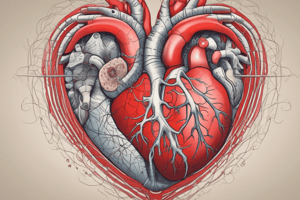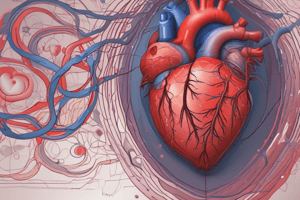Podcast
Questions and Answers
Which of the following is a recommended way to manage stress effectively?
Which of the following is a recommended way to manage stress effectively?
- Eating high-sugar snacks
- Binge-watching television shows
- Engaging in regular exercise (correct)
- Avoiding all social interactions
What is one of the primary benefits of knowing your family history of heart disease?
What is one of the primary benefits of knowing your family history of heart disease?
- It helps in assessing your risk for heart disease (correct)
- It means you no longer need to manage underlying conditions
- It ensures you can consume unlimited alcohol
- It allows you to avoid regular checkups
What should individuals do if they consume alcohol?
What should individuals do if they consume alcohol?
- Drink excessively to build tolerance
- Stop drinking entirely
- Only drink during holidays
- Limit their alcohol consumption (correct)
Which organization is suggested as a reliable resource for heart health information?
Which organization is suggested as a reliable resource for heart health information?
What is an important health practice related to managing underlying conditions like diabetes and high blood pressure?
What is an important health practice related to managing underlying conditions like diabetes and high blood pressure?
What is the primary concern of coronary artery disease (CAD)?
What is the primary concern of coronary artery disease (CAD)?
Which of the following describes heart failure?
Which of the following describes heart failure?
What does atherosclerosis refer to in the context of heart disease?
What does atherosclerosis refer to in the context of heart disease?
Which of the following can cause heart failure?
Which of the following can cause heart failure?
What are arrhythmias characterized by?
What are arrhythmias characterized by?
Which symptom is most associated with heart failure?
Which symptom is most associated with heart failure?
What role do the heart valves play?
What role do the heart valves play?
Which of the following best describes the term 'cardiovascular disease'?
Which of the following best describes the term 'cardiovascular disease'?
What is a common consequence of heart valve disease due to stenosis or regurgitation?
What is a common consequence of heart valve disease due to stenosis or regurgitation?
Which of the following is a non-modifiable risk factor for heart disease?
Which of the following is a non-modifiable risk factor for heart disease?
Cardiomyopathy primarily affects which part of the heart?
Cardiomyopathy primarily affects which part of the heart?
What is a common symptom of heart disease that is often overlooked?
What is a common symptom of heart disease that is often overlooked?
Which condition involves the narrowing of arteries in the limbs?
Which condition involves the narrowing of arteries in the limbs?
Which of the following can be a treatment for coronary artery disease?
Which of the following can be a treatment for coronary artery disease?
Which lifestyle choice can significantly reduce the risk of heart disease?
Which lifestyle choice can significantly reduce the risk of heart disease?
What role does smoking play in heart disease risk?
What role does smoking play in heart disease risk?
Which ethnic group is mentioned as having a higher risk of heart disease?
Which ethnic group is mentioned as having a higher risk of heart disease?
Which symptom could indicate heart failure due to fluid retention?
Which symptom could indicate heart failure due to fluid retention?
What happens to blood pressure when alcohol is consumed excessively?
What happens to blood pressure when alcohol is consumed excessively?
Which of the following is an example of a modifiable risk factor?
Which of the following is an example of a modifiable risk factor?
Which procedure is used to bypass blocked arteries in coronary artery disease?
Which procedure is used to bypass blocked arteries in coronary artery disease?
What can chronic stress negatively impact regarding heart health?
What can chronic stress negatively impact regarding heart health?
Flashcards
What is heart disease?
What is heart disease?
A broad category encompassing various conditions affecting the heart and blood vessels. It refers to a wide range of problems that can impair the heart's capacity to pump blood efficiently, leading to various health complications.
What is Coronary Artery Disease (CAD)?
What is Coronary Artery Disease (CAD)?
The most common type of heart disease, characterized by a buildup of plaque in the coronary arteries, narrowing them and reducing blood flow.
What is heart failure?
What is heart failure?
A condition where the heart struggles to pump blood effectively, leading to shortness of breath, fatigue, and swelling.
What are Arrhythmias?
What are Arrhythmias?
Signup and view all the flashcards
What is Heart Valve Disease?
What is Heart Valve Disease?
Signup and view all the flashcards
What is atherosclerosis?
What is atherosclerosis?
Signup and view all the flashcards
What is angina?
What is angina?
Signup and view all the flashcards
What is a heart attack?
What is a heart attack?
Signup and view all the flashcards
Valve Stenosis
Valve Stenosis
Signup and view all the flashcards
Valve Regurgitation
Valve Regurgitation
Signup and view all the flashcards
Congenital Heart Defects
Congenital Heart Defects
Signup and view all the flashcards
Cardiomyopathy
Cardiomyopathy
Signup and view all the flashcards
Peripheral Artery Disease (PAD)
Peripheral Artery Disease (PAD)
Signup and view all the flashcards
Non-Modifiable Risk Factors
Non-Modifiable Risk Factors
Signup and view all the flashcards
Modifiable Risk Factors
Modifiable Risk Factors
Signup and view all the flashcards
High Blood Pressure (Hypertension)
High Blood Pressure (Hypertension)
Signup and view all the flashcards
High Cholesterol
High Cholesterol
Signup and view all the flashcards
Smoking
Smoking
Signup and view all the flashcards
Diabetes
Diabetes
Signup and view all the flashcards
Obesity
Obesity
Signup and view all the flashcards
Physical Inactivity
Physical Inactivity
Signup and view all the flashcards
Unhealthy Diet
Unhealthy Diet
Signup and view all the flashcards
Chest Pain (Angina)
Chest Pain (Angina)
Signup and view all the flashcards
Smoking and Heart Health
Smoking and Heart Health
Signup and view all the flashcards
Stress Management for Heart Health
Stress Management for Heart Health
Signup and view all the flashcards
Alcohol Consumption and Heart Health
Alcohol Consumption and Heart Health
Signup and view all the flashcards
Regular Checkups for Heart Health
Regular Checkups for Heart Health
Signup and view all the flashcards
Managing Underlying Conditions
Managing Underlying Conditions
Signup and view all the flashcards
Study Notes
Heart Disease Overview
- Heart disease, also known as cardiovascular disease, encompasses various conditions affecting the heart and blood vessels.
- It's a broad term, referring to multiple problems impacting the heart's efficient blood pumping function.
Types of Heart Disease
- Coronary Artery Disease (CAD): Plaque buildup (cholesterol, fat, calcium) in coronary arteries restricts blood flow, potentially leading to chest pain (angina), heart attack (myocardial infarction), or sudden cardiac death.
- Heart Failure: Weakened heart's ability to pump blood efficiently causing shortness of breath, fatigue, and swelling in extremities. Underlying causes include CAD, high blood pressure, heart valve issues, and heart muscle diseases.
- Arrhythmias: Irregular heartbeats (too fast, too slow, or irregular) that can be harmless or life-threatening, leading to stroke or sudden cardiac death. Underlying factors include underlying heart conditions, electrolyte imbalances, and medications.
- Heart Valve Disease: Narrowed (stenosis) or leaky (regurgitation) heart valves disrupt blood flow, increasing heart workload, and potentially causing heart failure. Caused by congenital defects, infections (like rheumatic fever), or aging.
- Congenital Heart Defects: Problems with heart structure present at birth, ranging from minor to severe, requiring intervention or surgery.
- Cardiomyopathy: Diseases affecting heart muscle causing weakness, thickening, or stiffness. Different types with various causes and characteristics.
- Peripheral Artery Disease (PAD): Narrowing of arteries in the limbs (usually legs and feet) due to atherosclerosis, causing pain, numbness, and reduced blood flow.
Risk Factors for Heart Disease
- Non-modifiable risk factors: Age, family history, sex, and ethnicity (certain groups show increased risk).
- Modifiable risk factors: High blood pressure, high cholesterol, smoking, diabetes, obesity, lack of exercise, unhealthy diet, excessive alcohol, stress, and sleep apnea.
Symptoms of Heart Disease
- Common, but not universal: Chest pain (pressure, tightness, squeezing) that may radiate to other parts of the body's extremities.
- Other possible symptoms: Shortness of breath, fatigue, swelling in legs/ankles/feet, irregular heartbeat, dizziness, lightheadedness, chest discomfort, sweating, nausea/vomiting, and unexplained weight gain.
- Importance of immediate medical attention: If any of these symptoms occur, especially during activity or rest.
Treatments for Heart Disease
- Treatments vary: Based on the specific type and severity of the condition, often involving lifestyle changes, medications, minimally invasive procedures (like angioplasty and stenting), potentially surgery (CABG), and in severe cases, heart transplants.
Preventing Heart Disease
- Healthy lifestyle choices: Crucial for prevention.
- Diet: Focus on fruits, vegetables, whole grains, lean protein, healthy fats, and limit unhealthy fats, sodium, and added sugars.
- Weight Management: Losing even a small amount can be beneficial.
- Exercise: Aim for at least 150 minutes of moderate-intensity aerobic exercise per week.
- Smoking Cessation: Quit smoking or avoid it.
- Stress Management: Employ healthy stress coping mechanisms.
- Alcohol Limitation: If consumed, do so in moderation.
- Regular Checkups: Monitor blood pressure, cholesterol, and blood sugar.
- Manage underlying conditions: Control conditions like diabetes and high blood pressure effectively.
- Family History Awareness: Knowing family history helps assess risk and take preventative action.
Further Information
- American Heart Association (AHA) and Centers for Disease Control and Prevention (CDC) websites are valuable resources.
Studying That Suits You
Use AI to generate personalized quizzes and flashcards to suit your learning preferences.




